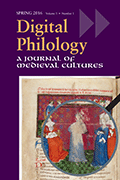
Johns Hopkins UniversityEst. 1876
America’s First Research University
Philology Lessons
As I went through interviews for my job almost four years ago, I found myself having to learn plenty of information. For instance, I had no idea what the word "philology" meant, and we had journals focused specifically on the subject. I had to expand my knowledge base.  I now know that philology is the study of language in written historical resources. So I found it interesting when I recently talked with Stephen G. Nichols, one of the founding editors of our new journal Digital Philology, that a publication dedicated to historical research has taken such a modern approach in its organization and planning. Not only will the journal--which just released its inaugural issue--take advantage of technology to help spread digitized versions of artifacts discussed in its pages, but Nichols and co-founding editor Nadia Altschul (who also serves as Executive Editor for the journal) have also taken solid steps to prepare the journal for the long haul. "The people who are running this, the managing editor and some of the editorial board, are all younger scholars, some of them just two or three years away from their Ph.D." Nichols told me in our recent podcast episode about the journal. "I work with them very closely so you have a whole intergenerational range, which I think is very healthy." Both Nichols and Althschul have experience as journal editors. He currently is one of the French Issue editors for MLN: Modern Language Notes while Altschul serves as one of the Hispanic Issue editors for the same journal. Nichols said their experience combined with the point of view of younger scholars like Digital Philology Managing Editor Albert Lloret will serve the journal well in the long run. This philosophy jumped out at me, especially after listening to presentations at the AAUP Annual Meeting about challenges which journals face to remain afloat in the current state of publishing. The merging of digital and printed material under the guidance of experienced and younger scholars certainly bodes well for this effort. Even if I didn't even know what the key word in the title meant four years ago.
I now know that philology is the study of language in written historical resources. So I found it interesting when I recently talked with Stephen G. Nichols, one of the founding editors of our new journal Digital Philology, that a publication dedicated to historical research has taken such a modern approach in its organization and planning. Not only will the journal--which just released its inaugural issue--take advantage of technology to help spread digitized versions of artifacts discussed in its pages, but Nichols and co-founding editor Nadia Altschul (who also serves as Executive Editor for the journal) have also taken solid steps to prepare the journal for the long haul. "The people who are running this, the managing editor and some of the editorial board, are all younger scholars, some of them just two or three years away from their Ph.D." Nichols told me in our recent podcast episode about the journal. "I work with them very closely so you have a whole intergenerational range, which I think is very healthy." Both Nichols and Althschul have experience as journal editors. He currently is one of the French Issue editors for MLN: Modern Language Notes while Altschul serves as one of the Hispanic Issue editors for the same journal. Nichols said their experience combined with the point of view of younger scholars like Digital Philology Managing Editor Albert Lloret will serve the journal well in the long run. This philosophy jumped out at me, especially after listening to presentations at the AAUP Annual Meeting about challenges which journals face to remain afloat in the current state of publishing. The merging of digital and printed material under the guidance of experienced and younger scholars certainly bodes well for this effort. Even if I didn't even know what the key word in the title meant four years ago.

